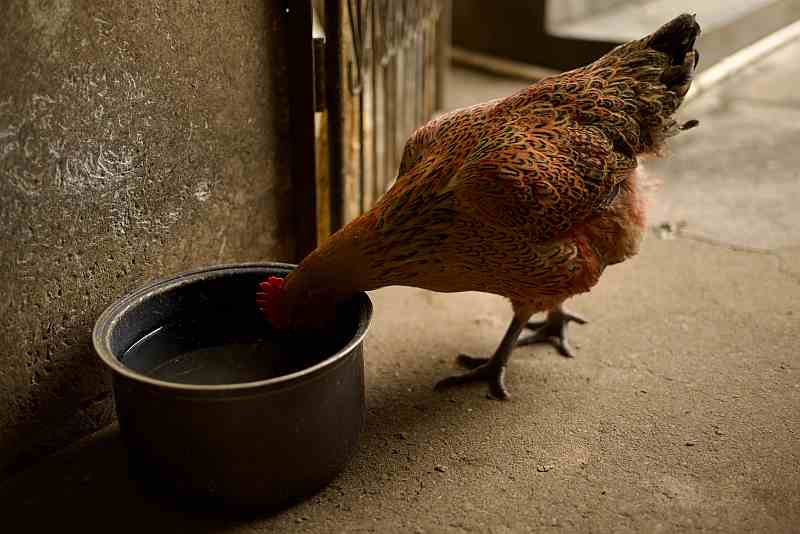Just as you shiver through winter’s chill, your chickens feel the cold snap, too. Keeping their water liquid can be a real headache. You’ve wrapped pipes, worn layers, and sipped hot drinks, but what about your feathered friends?
You’re about to master the art of how to keep chicken water from freezing. Insulation, heated dishes, and a few clever hacks will ensure your chickens stay hydrated all winter long. Let’s dive into practical, frost-free solutions.
Insulate Your Waterers
By insulating your chicken waterers, you’ll minimize the risk of water freezing during cold snaps. Thermal wrapping is a protective barrier, keeping the water at a consistent temperature despite fluctuating external conditions.
You’ll need to choose the right insulation materials to do this effectively. Options include foam insulation, bubble wrap, or even specialized poultry waterer insulators designed for this purpose.
Wrap these materials securely around your waterers, paying special attention to joints and seams where heat loss is most likely to occur. Ensure the insulation is waterproof to prevent moisture from compromising its insulative properties.
With proper installation, thermal wrapping will maintain liquid water availability, ensuring your chickens stay hydrated no matter how low the mercury drops.
Use Heated Water Dishes
Investing in a heated water dish is another effective method to prevent your chicken’s water from freezing. These dishes keep water liquid even in the coldest temperatures. They are designed with thermal materials that safely warm the water without overheating it. When choosing a heated dish, look for one that’s thermostatically controlled to save energy and maintain a consistent temperature.
Electrical safety is crucial. Ensure your heated dish has a chew-resistant cord and is plugged into a ground fault circuit interrupter (GFCI) outlet. Also, regularly inspect the unit for damage and follow the manufacturer’s instructions for use and maintenance.
With the right precautions and equipment, you can ensure your chickens have access to unfrozen water throughout winter.
Implement Solar Water Heating
Harnessing solar power for water heating can be an efficient way to prevent your chickens’ water from freezing. Understanding solar panel efficiency will help you determine the best setup for your coop.
Let’s explore the different types of solar water heaters to find a solution that keeps water liquid even in the coldest weather.
Solar Panel Efficiency
Implementing solar water heating, you’ll tap into renewable energy to prevent your chicken’s water from freezing, capitalizing on the sun’s rays even during the coldest days. To ensure maximum efficiency of your solar panels and minimize solar degradation, be mindful of the following:
- Panel Placement: Position your panels to face true south (in the Northern Hemisphere) to capture optimal sunlight.
- Angle of Installation: Tilt your panels according to your latitude for the best angle year-round.
- Regular Cleaning: Keep panels clear of debris, snow, and bird droppings to maintain efficiency.
- Monitoring for Wear: Check for signs of wear and tear that can affect performance over time, and address any issues promptly.
Water Heater Types
Several types of solar water heaters are available, each with its benefits for keeping chickens’ water from freezing. Optimal water placement is critical; position the solar collector in a location with maximum sunlight exposure. Active solar water heaters use pumps to circulate water through the system, while passive systems rely on gravity and water’s natural tendency to circulate as it heats up.
Most solar water heating systems include:
Thermostat integration.
Ensuring the water remains at a consistent temperature.
Preventing freezing without wasting energy.
It’s practical to have a system that automatically adjusts to the sun’s intensity, reducing the need for manual intervention and ensuring your flock always has access to liquid water.
Employ the Power of Movement
You can prevent your chickens’ water from freezing by introducing movement to the water. Consider adding a water agitator or installing a circulating system, which keeps water flowing and makes it more resistant to freezing.
These systems are especially effective because constantly moving water requires much lower temperatures to freeze compared to stagnant water.
Water Agitators
Employing water agitators can prevent your chicken’s water supply from freezing by continuously stirring the liquid, thus thwarting ice formation. By understanding thermal dynamics, you can see how movement inhibits the steady cooling process that allows ice to form and float on the surface.
Here’s how you can implement this strategy:
- Integrate a solar-powered water agitator that harnesses natural energy during daylight hours.
- Install a battery-powered water circulator to ensure continuous movement, even overnight.
- Consider a submersible water pump that creates a current, preventing ice from forming.
- Utilize a floating water agitator that activates when the temperature drops, keeping the surface agitated.
Circulating Systems
Set up a circulating system in your chicken coop’s water supply to keep it from freezing, as constant movement breaks up ice before it can form. Understanding thermal dynamics is key to effective ice prevention. In a circulating system, water continuously moves, making it more difficult for ice crystals to anchor and grow. You’ll need a pump to create a flow that’s strong enough to prevent freezing yet gentle enough not to stress your flock.
Ensure the system is well-insulated to minimize heat loss. The energy needed for circulation is far less than that required for heating, making this a practical solution. Properly maintaining a circulation system can be a reliable method for ensuring your chickens have access to liquid water even in the coldest conditions.
Repurpose Household Items
While searching for a cost-effective solution, consider using items you already have at home to prevent your chicken’s water from freezing. Here’s a practical guide on how to repurpose common household items:
- Warm Bricks: Heat bricks in your oven and place them around the water container. The retained heat will help in keeping the water from freezing.
- Bubble Wrap: Insulate the water container with bubble wrap to provide a barrier against the cold.
- Plastic Bottles: Fill with salt water and place them in the water to lower the freezing point.
- Styrofoam: Use a Styrofoam base to insulate the bottom of the water container.
Each method employs thermal principles to maintain liquid water, ensuring your chickens stay hydrated in cold weather.
Monitor and Maintain Regularly
Checking your chickens’ water supply daily ensures that your repurposed items are effectively preventing ice formation. Regular monitoring is crucial, especially during winter, when temperatures can plummet without warning. Conduct temperature checks each morning to assess the water’s condition. If the temperature is close to freezing, consider adding more insulation or adjusting your current setup.
Stay alert for frost alerts in your area, which can indicate a sudden drop in temperature that might compromise your water-warming methods. If an alert is issued, promptly reinforce your system against the impending cold.
Through diligent maintenance, you’ll ensure your chickens consistently access liquid water, safeguarding their health and well-being during the coldest periods.
Frequently Asked Questions
Can Adding Salt or Sugar to the Chicken Water Prevent It From Freezing?
Adding salt or sugar to water can lower the freezing point, but doing so risks salt toxicity or sugar-induced bacteria growth, which could harm your chickens. It’s not a recommended method for preventing freezing.
Are There Any Breeds of Chickens That Are Particularly Good at Keeping Their Water From Freezing?
Interestingly, no chicken breed’s feathering or resilience can prevent their water from freezing — that’s your job. You must employ insulation, heaters, or frequent water changes to tackle that challenge.
How Can I Keep My Chicken Water From Freezing if I Live Off-Grid and Have Limited Access to Electricity?
You must deploy insulation strategies and solar solutions to ensure your water stays liquid. Wrap containers with insulating materials and consider solar-powered water heaters designed for off-grid use.
What Are the Potential Health Risks for Chickens if They Consume Water That Has Repeatedly Frozen and Thawed?
If you let your chickens drink water that’s been a frozen battleground, you’re walking on thin ice. Chickens’ freezing tolerance doesn’t shield them against immunological concerns from such harsh conditions.
Can the Type of Water Container Material (Plastic, Metal, Etc.) Affect How Quickly the Water Freezes, and if So, Which Material Is Best for Cold Climates?
Yes, the material’s insulation and thermal properties affect water’s freezing rate. For cold climates, choose a container with high insulation; typically, thick plastic insulates better than metal and slows down the freezing process.
Conclusion
As winter claws at your coop, contrast the chill with innovation. Insulate your waterers, embrace heated dishes, harness the sun, and stir life into the stillness. Everyday items can morph into frost-defying tools.
But vigilance is key; monitor and maintain. With these strategies, you’re not just preventing ice. You’re safeguarding the vitality of your flock. Practical meets technical, ensuring your chickens thrive amidst the cold, their water a flowing testament to your care.

